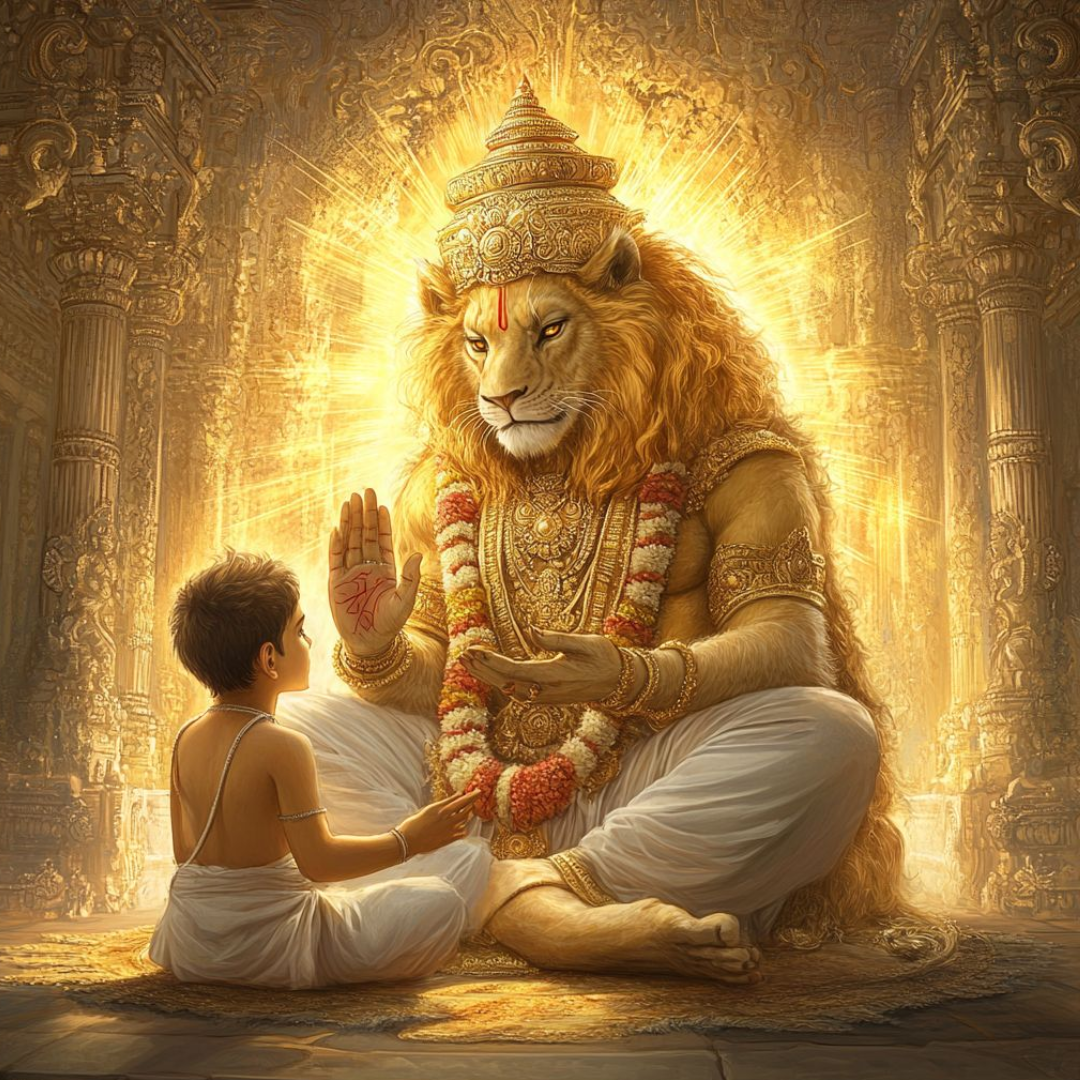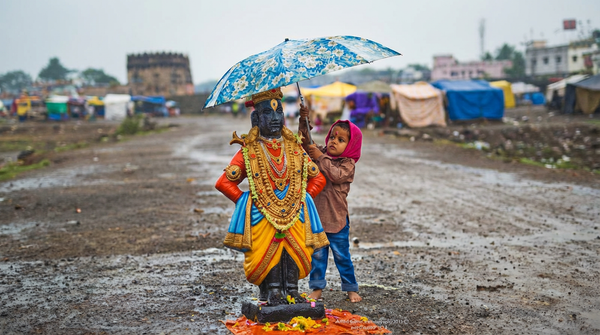Daily Devotion - Sep 24, 2025 (English)- Narad Bhakti Darshan - Part 9

The nature of desire is opposed to the nature of Bhakti. We must remain cautious of them.
Whenever God descends on earth -
- He says to the devotee, "varaṁ brūhi, ask for a boon, my child!" He does not wish to force anything upon anyone. Whatever you ask according to your preference, you shall receive.
- God is a kalpavṛkṣa (wish-fulfilling tree). You will receive whatever you ask from Him - whether it is a tamasic, rajasic, sattvic, or a divine object.
So, Lord Narasimha also said to Prahlād, "Son, ask for a boon."
Prahlād felt deeply troubled and began to think, "To ask is the work of a beggar. One asks for something only when there is some desire. But desire is the enemy of Bhakti. How then did the omniscient Lord tell me to ask for a boon? Does this mean devotion has not yet arisen within me?"
Prahlād said -
ahaṁ tvakāmastvad bhaktastvaṁ ca svāmyanapāśrayaḥ (Bhāgavat)
"O Lord! One who asks something from his master is not truly a servant; he is not a devotee. Have You then not accepted me as Your servant? The duty of a servant is to serve - to only give and give, to surrender completely. Even after offering countless lives, one should not feel satisfied. One should think that whatever I have offered is worthless. I possess nothing of value - so what can I truly give? However great worldly possessions may be, their value before You is less than nothing, for they are made of material nature - impure and inert."
Lord Narasimha smiled and said, "Still, you should ask for something, because it is customary to ask for a boon."
Prahlād said, "Very well, O Lord! If that is so, then I ask You for this boon -
kāmānāṁ hṛdyasaṁrohaṁ bhavatastu vṛṇe varam॥ (Bhāgavat)
Maharaj! May no desire ever arise in my heart for all eternity in the future. May the tendency to ask never awaken within me."
The nature of desire -
This world is dreadful in such a way that the more one receives, the stronger the desire becomes. Just as when ghee is poured upon a burning flame, the fire blazes with greater force, in the same way, desires only intensify. Therefore, you must stay away from them. Establish this firmly in your intellect.
This is why Kunti prayed for this boon -
vipadaḥ santu naḥ śaśvattatra tatra jagadguro। (Bhāgavat)
"O Lord! Grant me the absence of worldly possessions - in other words, take them away from me - for they only serve to increase desires."
Another point is this: you are the heir of Shri Krishna, as stated earlier. You are not a beggar who should harbor desires. Just as a son, by virtue of being an heir, does not beg from his father but rightfully receives what belongs to him, in the same way, you should not stand before God as a beggar.
But here lies the problem of creating desires -
With what do you create desires? With the intellect. Whose creation is the intellect? It is māyā, the mother of desires. Therefore, whatever desire the intellect produces will only be material. And so you will ask only for material things.
After such effort, you attain God, and then you ask for the world! Or worse, you begin asking even without attaining Him – which is what happens in the name of Bhakti in 99.9% of cases today. This is like obtaining a license for a gun and then firing a bullet into your own chest.
Gaurang Mahaprabhu says: ei baḍa mūrkha। āmāya bhaje māṅge viṣaya sukha
"How foolish is the soul that practices devotion to Me, yet asks for worldly happiness!"
Even if you make desires, you cannot make them rightly. Why then fall into such a trap? Leave everything to God. Think to yourself, "Since I have surrendered myself, I have no right to use my intellect in this way. Therefore, I have no right to ask. And I know -
yogakṣemaṁ vahāmyaham।
'Yog' means granting what has not yet been attained. 'Kṣema' means protecting what has already been attained. When God Himself takes on both responsibilities for the surrendered soul, why should I apply your material intellect?"
Types of desires and their danger -
- Worldly and heavenly desires:
Whether desires belong to this world, heaven, or anywhere in the material realm - you must not take refuge in them. They must be uprooted completely from the heart, because all of them contain a mixture of poison. There is only a difference in the appearance. In bhū, bhuvaḥ, mahaḥ, janaḥ, tapaḥ, satya loka, there are progressively greater opulences, yet in all of them lies the same poison – dissatisfaction, incompleteness, and unrest. - The desire for Advaita Mukti -
One particularly dreadful desire is liberation. It has many names: Advaita mukti, Kaivalya mukti, Sāyujya mukti, and Ekatva mukti. What happens in this? The machine by which desires are produced, the antaḥkaraṇa (the mind), ceases to function. Without it, no desires remain - neither worldly desires nor even the desire for God - one merges with Brahm and becomes Brahma-rūpa.
Upon attaining Advaita mukti, a soul departs from this world forever. He can never return. And thus the bliss of Shri Krishna, the bliss of divine love, the bliss of Ram - all are lost forever. According to the principles of Nārad Bhakti Darshan, those who harbor the desire for liberation are even more condemnable.
tāramadhye mokṣa vāñchā kaitava pradhāna।
"Among dangerous things, mukti is the most dangerous."
Dharma, artha, and kāma are desires that keep the soul wandering in the world. While wandering, one might by chance meet a genuine rasik saint, receive true knowledge, accept it, and eventually attain the bliss of divine love. But when the world itself is finished, and one is freed from the cycle of coming and going (birth and death), then that chance is gone forever. This is why the Bhāgavatam begins by saying -
dharmaḥ projjhitakaitavo'tra paramo nirmatsarāṇāṁ satām।
The Bhāgavatam begins only after renouncing even the desire for liberation.
Bhakti-ras, the nectar of devotion, is attained only in duality - Bhakt, Bhagavān, Bhakti. Devotion connects a devotee with God. Where this triad ends - jñātā (knower), jñeya (the One to be known), jñāna (knowledge); draṣṭā (seer), dṛśya (the one to be seen), dṛṣṭi (sight) all come to an end. This desire for mukti is thus the greatest enemy of divine love. Therefore, even the Vedas praise -
na parilaṣanti kecidapavargamapīśvara te।
Those who are tattvajñas, who understand the essence of Bhakti-ras, do not desire liberation. dīyamānaṁ na gṛhṇanti vinā matsevanaṁ janāḥ - They do not accept it, even when it is offered.
When Mukti appeared before a saint, he asked, "Kā tvaṁ?" (Who are you?) She said, "I am Mukti. Shri Krishna has sent me as a maidservant." The saint immediately told her, "dūre tiṣṭha... tvadgandhān nija nāma candana rasālepasya lopo bhavet -
"I do not want such a maidservant - Stay far away, you dangerous one. With your arrival, poison will seep into the bliss of my Lord's names, qualities, and pastimes."
- The desire for the four dualistic liberations:
Sāmīpya, sārṣṭi, sālokya, and sārūpya are the four dualistic liberations. If you wish to attain the supreme bliss of divine love, you must abandon even the desire for these. In them, the body, senses, mind, and intellect remain - they become divine, but they still remain.
Yet a desire is still a desire. Why should you ask for anything? You are a servant. The duty of a servant is to keep his desire aligned with the desire of his master. A servant should have no desire of his own -
nāstyeva tatsukhasukhitvam (Sutra 24)
(To be continued...)
Recommended books by Jagadguru Shri Kripalu Ji Maharaj related to this topic:





